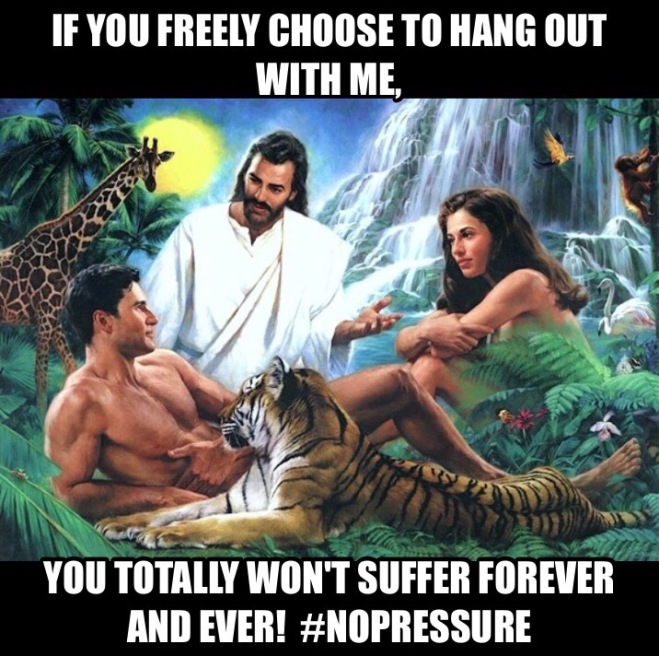You might need Drop Box to listen, not sure… This is nothing deep or profound, i’m just simply baffled. Donald (Robin Hood) Trump
No Cherubim for the tree of knowledge
Occasionally I review Bible verses i had memorized in my previous life as a believer. Yesterday i was reciting Genesis chapter 3 and it reminded me of a silly question… The deities didn’t want Adam and Eve to eat from the Tree of Life, so they put “cherubims and a flaming sword” to protect it. The Tree of Knowledge on the other hand was placed in the middle of the garden, and left unguarded. What did the deities really want? The actions contradict the words.
Genesis 22 has been on my mind a lot lately as well. After this incident, when receiving new orders, did Abraham start wondering if the diety was serious? If the diety ocassionally tricks you or engages in deception, how are you to know when the deity is sincere?
I don’t believe you really believe.
I am perpetually baffled by people who claim to love The Bible, people who claim to believe it was written or inspired by the creator of the universe, yet it is left untouched. I just can’t take you seriously. Read it cover to cover a couple times and then lets talk. Until then i see no reason to believe that you really believe it has a divine origin.
#nopressure
Koran Predates Muhammed?
Very interesting read. I don’t know much about Islam, I still need to read the Koran at least once…
What if you were placed in a labrynth without your consent?
What if someone kidnapped you and trapped you in a deadly labyrinth. Within the labyrinth there are very specific rules you must follow. You can only escape the labyrinth if you follow the rules and maps, but here’s the catch, there are multiple sets of contradictory rules and maps inscribed on the walls. There is no sure way to know which set of rules is the correct set. Now to make it a little tougher you only have one week. If you don’t make it out in seven days you’ll be killed. This makes it tricky because you have to keep moving. There are so many sets of rules, you can’t even stop to read them all before the time runs out. If you take too much time trying to figure out which set of rules is the correct one, you might not make it to the exit in time. To mess with you even more, there will be other people there who will try to trick you into thinking they know they way, but no one that has ever escaped has ever returned. Should you just follow the path everyone else around you is taking? Should you arbitrarily pick one set and just hope that you happened to pick the right one? Should you just ignore all the rules and make up your own? What would you do? What if you ignored the idea of escaping and chose to enjoy your time there instead of spending every moment stressing about rules and searching for an exit that may not even exist? One last question, If this person was willing to kidnap you and throw you into a maze without your consent, what makes you think you can trust him or any of the sets of rules you find in his labyrinth?
Do people stick with their beliefs out of pride?
if you’ve spent your whole life thinking Jesus is God or Allah or whatever, is it hard to let it go because you’ve put so much time into it? Is it largely a matter of not wanting to admit to yourself that you may have been wrong all this time?
Don’t lean on your own understanding
Proverbs 3:5 Tells us to “Trust in the Lord with all thine heart, and lean not unto your own understanding…” Here is one of many stories that show what happens when people set aside their own “understanding” and reasoning abilities in favor of what they think a higher power has said: Christian Homeschoolers Keep Girl as Sex Slave
If you can’t trust your own brain to come to reasonable conclusions, how can you trust that the idea of setting aside your reason and trusting god is a good idea?
Understanding Religion
The greater the ignorance the greater the innocence
Near the end of my door knocker / evangelist days the following verse began to trouble my conscience. This verse in my mind creates a lot of problems for the evangelist.
If your goal as an evangelist is to spread joy, and increase the overall joy in the universe (as was mine) this verse is going to bother you.
If you believe that non-believers will go to hell, or that they will have to suffer in some way for eternity even if this suffering is supposed to be the absence of gods presence for eternity and you have concern for your fellow man, you might find yourself knocking on doors…. that is until you ponder these verses:
2 Peter 2:20-22
King James Version (KJV)
20 For if after they have escaped the pollutions of the world through the knowledge of the Lord and Saviour Jesus Christ, they are again entangled therein, and overcome, the latter end is worse with them than the beginning.
21 For it had been better for them not to have known the way of righteousness, than, after they have known it, to turn from the holy commandment delivered unto them.
22 But it is happened unto them according to the true proverb, The dog is turned to his own vomit again; and the sow that was washed to her wallowing in the mire.
Verse 20 implies that the uninformed and/or unrighteous are in a bad, spot, and according to the previous verses, headed for hell.
If you start as an uninformed person, find Jesus and learn the “way of righteousness” and then reject it all and go back to the way you were, then you will be worse off than the beginning.
Does this mean you will be more severely punished or now headed for a worse place than hell?
Or a worse part of hell?
Is there a worse place than hell?
This verse touches on a simple principle which I have pondered quite a bit: The higher you go, the harder you’re going to hit when you fall.
I began to feel that by informing people I was giving them not only a chance to climb, but more likely a chance to fall harder than they would have otherwise.
If the uninformed are considered innocent, unworthy of punishment and in no danger, then there is no point in informing them. Informing them under this premise would only serve to put them in danger by removing their innocence.
If they are in danger despite their innocence, then according the Verse 20 I am giving them the potential to end up worse off than before. Even in this scenario I’m putting them in greater danger.
I began to feel that only a spiteful person could consider these verses and continue knocking on doors!
Recently I’ve begun to examine these verses in my mind a little more thoroughly.
These verses imply that the uninformed are more innocent than the informed, and less worthy of punishment for transgressions.
These verses seem to imply that there may be different levels of hell, and that some places in hell are “worse” than others. It also implies that your place in hell depends on the severity of your crimes and that the severity of your crimes depends on your understanding of the law.
When children commit crimes why don’t we try them all as adults? Because a reasonable person believes that the severity of the punishment depends not just on the crime, but on the perpetrators understanding of the crime. If you are ignorant of the laws or ignorant of the effects of your behavior no reasonable person would demand that you be punished as severely as someone who transgresses while fully understanding the harm they are doing.
If god is reasonable, he would have to agree.
If god was good and reasonable he would not punish those who lived and died and never heard of Jesus.
A reasonable god has several options:
1. Give those died without hearing gods plan a chance to hear and accept it in the afterlife.
(This is nice but it presents new problems… how are they to be blessed or punished for their behavior during the afterlife? If they never have to walk the walk amidst all the trials and temptations of mortal life i’d say their ‘test’ is quite a bit easier and they are less deserving of reward. If god agreed with that it would create yet another problem, since they were never informed on earth they never even had a chance to reach the amazing part of heaven that the rest of are shooting for. It wouldn’t be fair in the slightest!)
2. Since god is all-knowing, he could judge you based on what you would-have done had you been informed during your mortal life on earth.
Both of these options present a new problem which makes the whole thing crumble. If god can give one person the option to accept Jesus after they die, why can’t he do the same for everyone? The need for informing anyone on earth instantly disappears.
If god can judge one person based on what they would-have done, why can’t he do the same for everyone? If we can all live our lives in sinful ignorance, and then be punished or rewarded based on what we would-have done, then whats the point of god telling anyone about his “plan” at all? The need for evangelism disappears.
Of course there are still other problems that this whole “would-have” thing creates. How about timing? Will a 5 year old hearing “the word” for the first time be more receptive than the 15 year old? How about the 35 year old or the 70 year old? Which version of you will god judge you by?
What about the time period or country you lived in? If you were born in the 7th century AD would you be more receptive than if you were born in the 18th or 21st?
If god caused you to be born in Egypt and a Christian came preaching to word to you, would you be less receptive than if you had been born in Alabama in the 20th century?
I love the timing question. Yet another hilarious way to look at the whole judgement thing.
Not everyone lives the same number of years. Lets say you are a believer who dies the day before he was supposed to have a discussion with a very convincing humanist, or muslim, or scientologist. Lets say god knows the future and he knows that you would have turned from Jesus had you lived a couple more days? Will god judge you based on what you would-have done? Or are you ‘in’ because you died before your belief did?
Obviously you could reverse this story and have the non-believer killed the day before he was supposed to meet the very convincing evangelist.
“Oh you’re in hell too! What are you in for?”
“I lived one day too few.”
The greater the ignorance, the greater the innocence. This doesn’t mean that the ignorant do no harm, it means that even the bible has a little bit of reason in it 😉 Romans 4:15, 5:13
“Father forgive them, for they know not what they do.”



